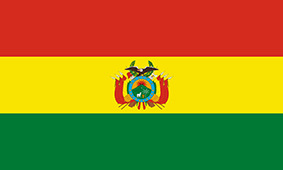
Election-bound Bolivia faces waning gas flows

Morales, a populist ally of Venezuela's US-sanctioned government, is running for a fourth term. The most recent voter poll, by Ipsos, gives him a substantial lead of 40pc compared to 22pc for his nearest competitor, former president Carlos Mesa. The margin is wide enough to suggest that Morales will prevail in a first round, avoiding a 15 December run-off.
If the numbers stand, Morales will head for another five-year term, which he has promised would be his last.
The next president, regardless of the results, will be faced with tough economic choices as gas output and exports, which have underpinned economic growth throughout Morales' 14-year tenure, are dropping.
"Natural gas is not going to have the same role as in the past. It will remain important, but revenue is falling and that will put pressure on government accounts. There will be changes even if the president is re-elected," said Ruben Ferrufino, an economist at Bolivia's business chamber.
Gas has been at the center of Morales' political career, notably when he helped to block a government plan in 2003 to export LNG through neighboring Chile. The president at the time, Gonzalo Sanchez de Lozada, was forced to resign and flee the country. The turmoil helped Morales win the presidency in the 2005 elections, and he has been re-elected twice. He nationalized the gas industry in May 2006, forcing companies, such as Total and Repsol, to scale back their contract terms in favor of the state.
Morales' supporters remain bullish on the government's control over natural resources.
"He is the only president we have had who has protected Bolivia's resources. We are no longer a poor country because he nationalized gas," said local vendor Jorge Sulturo at Morales' closing rally on 16 October.
Morales' re-election bid is controversial. In a referendum to decide if the constitution should be changed to allow him to run again, 51pc voted no. Morales appealed to the Constitutional Court, which ruled that term limits violated his political rights.
While polls are running in the president's favor, his numbers are far below the 60.5pc he received in 2015. His Movement to Socialism party, while also ahead in generic congressional balloting, is unlikely to have the super majority it has enjoyed for 10 years. Morales may even have to govern for the first time with an opposition-led legislature.
On the economic front, the International Monetary Fund forecasts growth of 3.9pc for the year, far outpacing the regional average, but still the lowest annual growth since the global economic crisis in 2009.
Gas production has been falling off a 2015 peak of 60mn m3/d, to 53.2mn m3/d last year and just 45.5mn m3/d in July, according to hydrocarbons regulator ANH.
Bolivia exports gas through pipelines to Argentina and Brazil. Its exports to Argentina have averaged around 18mn m3/d, but they have fallen drastically to Brazil as that country's domestic gas flows balloon thanks to offshore pre-salt reservoirs, and LNG imports. The Argentinian market for Bolivian gas is poised to shrink as well as a result of enormous shale reserves.
July exports to Brazil fell to just 12.9mn m3/d, down from 23.9mn m3/d a year earlier. The 24mn-30mn m3/d supply contract with Brazil expires this year but will run through 2024 to soak up remaining contracted volumes.
The government is working to establish new export contracts with Paraguay and Peru, and is competing to directly supply private-sector gas distributors in Brazil in place of state-controlled Petrobras, but the potential volumes are lower.
Ferrufino said the incoming government will be required to make adjustments, as lower gas revenue will not allow the state to continue with aggressive public investment.
"A stabilization plan will be required as the economy changes. It will be better to grow as lower rates sustainable than try to grow at higher rates that will only deteriorate public accounts," he said.


Trump weighs using $2 billion in CHIPS Act funding for critical minerals

Codelco cuts 2025 copper forecast after El Teniente mine collapse

Electra converts debt, launches $30M raise to jumpstart stalled cobalt refinery

Barrick’s Reko Diq in line for $410M ADB backing

Abcourt readies Sleeping Giant mill to pour first gold since 2014

Nevada army depot to serve as base for first US strategic minerals stockpile

SQM boosts lithium supply plans as prices flick higher

Viridis unveils 200Mt initial reserve for Brazil rare earth project

Tailings could meet much of US critical mineral demand – study

Kyrgyzstan kicks off underground gold mining at Kumtor

Kyrgyzstan kicks off underground gold mining at Kumtor

KoBold Metals granted lithium exploration rights in Congo

Freeport Indonesia to wrap up Gresik plant repairs by early September

Energy Fuels soars on Vulcan Elements partnership

Northern Dynasty sticks to proposal in battle to lift Pebble mine veto

Giustra-backed mining firm teams up with informal miners in Colombia

Critical Metals signs agreement to supply rare earth to US government-funded facility

China extends rare earth controls to imported material

Galan Lithium proceeds with $13M financing for Argentina project

Kyrgyzstan kicks off underground gold mining at Kumtor

Freeport Indonesia to wrap up Gresik plant repairs by early September

Energy Fuels soars on Vulcan Elements partnership

Northern Dynasty sticks to proposal in battle to lift Pebble mine veto

Giustra-backed mining firm teams up with informal miners in Colombia

Critical Metals signs agreement to supply rare earth to US government-funded facility

China extends rare earth controls to imported material

Galan Lithium proceeds with $13M financing for Argentina project

Silver price touches $39 as market weighs rate cut outlook

















